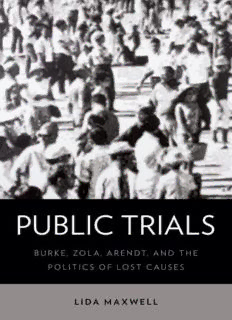
Public Trials: Burke, Zola, Arendt, and the Politics of Lost Causes PDF
Preview Public Trials: Burke, Zola, Arendt, and the Politics of Lost Causes
PUBLIC TRIALS P U B L I C T R I A L S Burke, Zola, Arendt, and the Politics of Lost Causes LIDA MAXWELL 3 1 Oxford University Press is a department of the University of Oxford. It furthers the University’s objective of excellence in research, scholarship, and education by publishing worldwide. Oxford New York Auckland Cape Town Dar es Salaam Hong Kong Karachi Kuala Lumpur Madrid Melbourne Mexico City Nairobi New Delhi Shanghai Taipei Toronto With offices in Argentina Austria Brazil Chile Czech Republic France Greece Guatemala Hungary Italy Japan Poland Portugal Singapore South Korea Switzerland Thailand Turkey Ukraine Vietnam Oxford is a registered trademark of Oxford University Press in the UK and certain other countries. Published in the United States of America by Oxford University Press 198 Madison Avenue, New York, NY 10016 © Oxford University Press 2015 All rights reserved. No part of this publication may be reproduced, stored in a retrieval system, or transmitted, in any form or by any means, without the prior permission in writing of Oxford University Press, or as expressly permitted by law, by license, or under terms agreed with the appropriate reproduction rights organization. Inquiries concerning reproduction outside the scope of the above should be sent to the Rights Department, Oxford University Press, at the address above. You must not circulate this work in any other form and you must impose this same condition on any acquirer. Library of Congress Cataloging-in-Publication Data Maxwell, Lida. Public trials : Burke, Zola, Arendt, and the politics of lost causes / Lida Maxwell. pages cm Includes bibliographical references and index. ISBN 978-0-19-938374-0 (hardback) 1. Democracy—Philosophy. 2. Justice, Administration of—Philosophy. 3. Hastings, Warren, 1732–1818—Trials, litigation, etc. 4. Burke, Edmund, 1729-1797. 5. Dreyfus, Alfred, 1859-1935—Trials, litigation, etc. 6. Zola, Emile, 1840–1902. 7. Eichmann, Adolf, 1906-1962—Trials, litigation, etc. 8. Arendt, Hannah, 1906–1975. I. Title. JC423.M3786 2014 320.01’1—dc23 2014014575 135798642 Printed in the United States of America on acid-free paper FOR MY PARENTS, Carol Maxwell and Phil Maxwell Many Theresas have been born who found for themselves no epic life wherein there was a constant unfolding of far-resonant action; perhaps only a life of mistakes, the off- spring of a certain spiritual grandeur ill-matched with the meanness of opportunity; perhaps a tragic failure which found no sacred poet and sank unwept into oblivion.. . . Here and there is born a Saint Theresa, foundress of noth- ing, whose loving heart-beats and sobs after an unattained goodness tremble off and are dispersed among hindrances, instead of centring in some long-recognizable deed. —George Eliot, “Prelude” to Middlemarch CONTENTS Acknowledgments ix 1. Public Trials and Lost Causes: The Politics of Democratic Failure 1 2. Justice, Sympathy, and Mourning in Burke’s Impeachment of Warren Hastings 37 3. A Public Taste for Truth: Zola’s Literary Appeals to the People in the Dreyfus Affair 81 4. Comedy and/of Justice? Law, Politics, and Public Opinion in Arendt’s Writings on the Eichmann Trial 121 5. Toward a Democratic Conception of Justice 161 Notes 189 Index 225 ACKNOWLEDGMENTS Hannah Arendt says that our supposedly solitary process of thought is deeply shaped and sparked by our conversations and interactions in the world. Happily, that is surely the case with this book. It is a pleasure to acknowledge here the individuals and institutions that have offered varied forms of support, advice, criticism, and thoughts during the conception and writing of this book. I can say in all truthfulness that I never would have become a politi- cal theorist were it not for Roxanne Euben. In the last semester of my senior year at Wellesley College, while finishing up my Religion major, I took a seminar in “Feminist Political Theory” with Roxanne. I was so blown away by that class that I decided not to go to law school and to apply to graduate programs in political theory instead. Thanks to Roxanne for opening my eyes to what theory is and could be, and for her continuing enthusiasm for and support of my work. This book has its origins in my doctoral dissertation at Northwestern University. At Northwestern, Bonnie Honig, Linda Zerilli, Sara Monoson, and Miguel Vatter were supportive and encouraging advi- sors, and they created a stimulating environment in which to study political theory. In particular, Linda Zerilli encouraged me to pur- sue my idiosyncratic thoughts from the outset and spent countless hours with me in her office, talking about Benjamin, Burke, Arendt, Montesquieu, Rousseau, and all the other thinkers I was enamored of. Linda’s early support of me, and these long conversations, helped me to figure out how and why I love doing political theory. I am tremen- dously grateful for this, and for her continued support. As my dissertation advisor and beyond, Bonnie Honig has given incredible support to me and my work—more than I could describe or
Description: